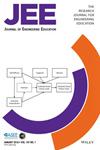Leveraging AI-generated synthetic data to train natural language processing models for qualitative feedback analysis
Abstract
Background
High-quality feedback is crucial for academic success, driving student motivation and engagement while research explores effective delivery and student interactions. Advances in artificial intelligence (AI), particularly natural language processing (NLP), offer innovative methods for analyzing complex qualitative data such as feedback interactions.
Purpose
We developed a framework to train sentence transformers using generative AI–created synthetic data to categorize student-feedback interactions in engineering studios. We compared traditional thematic analysis with modern methods to evaluate the realism of synthetic datasets and their effectiveness in training NLP models by exploring how generative AI can aid qualitative coding.
Methods
We deidentified and transcribed eight audio recordings from engineering studios. Synthetic feedback transcripts were generated using three locally hosted large language models: Llama 3.1, Gemma 2.0, and Mistral NeMo, adjusting parameters to produce datasets mimicking the real transcripts. We assessed the quality of synthetic transcripts using our framework and used a sentence transformer model (trained on both real and synthetic data) to compare changes in the model's percent accuracy when qualitatively coding feedback interactions.
Results
Synthetic data improved the NLP model's performance in classifying feedback interactions, boosting the average accuracy from 68.4% to 81% with Llama 3.1. Although incorporating synthetic data improved classification, all models produced transcripts that occasionally included extraneous details and failed to capture instructor-dominant discourse.
Conclusions
Synthetic data offers an opportunity to expand qualitative research, particularly in contexts where real data for NLP training is limited or hard to obtain; however, transparency in its use is paramount to maintain research integrity.

 求助内容:
求助内容: 应助结果提醒方式:
应助结果提醒方式:


